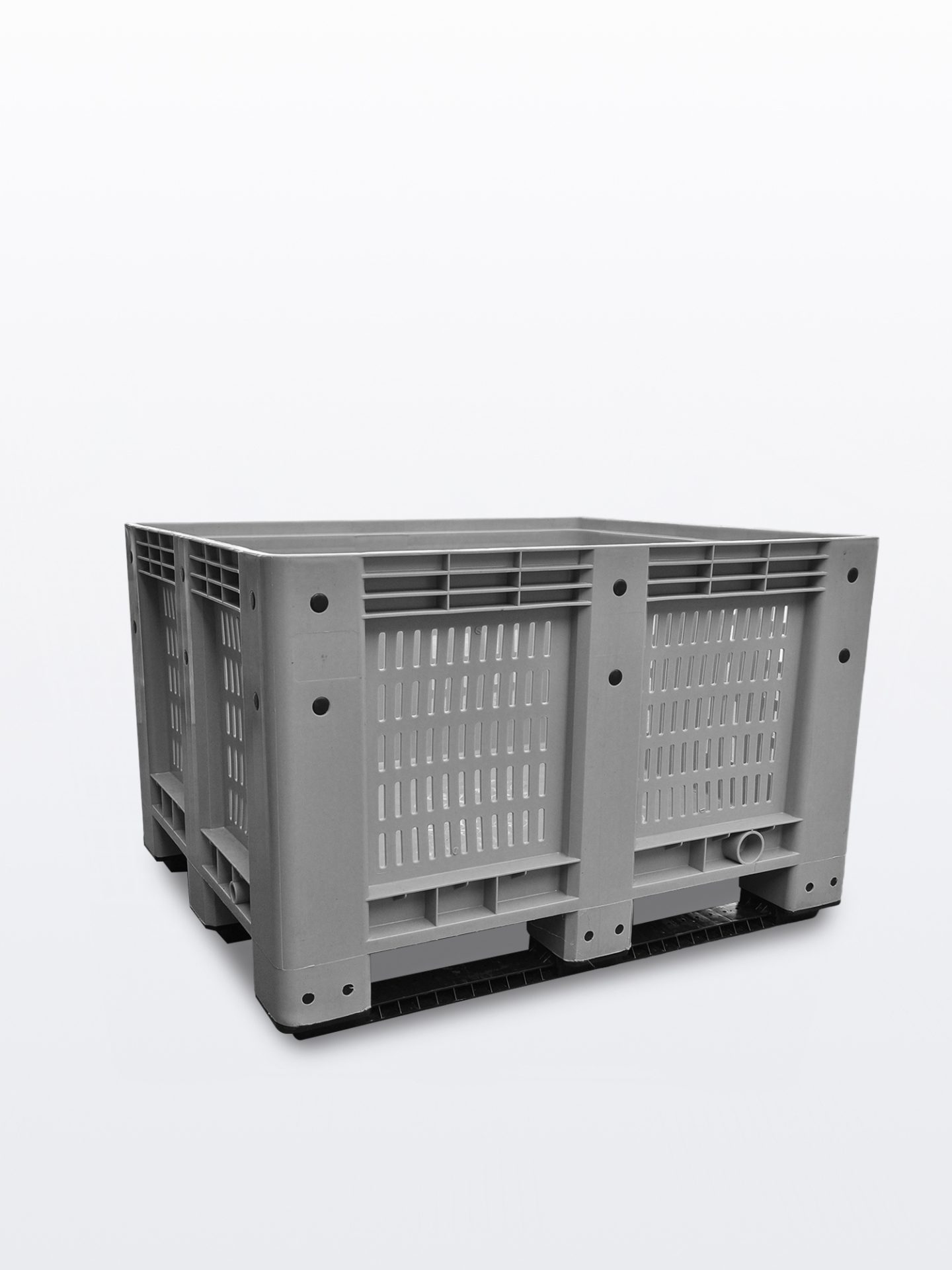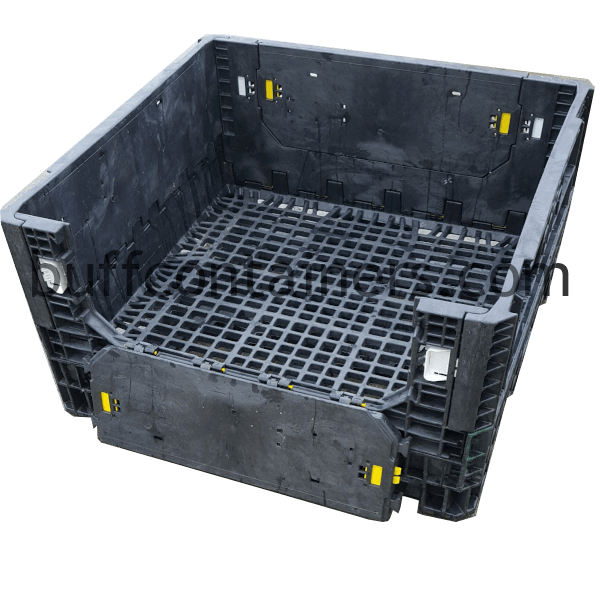Discover how durable Bulk Plastic Containers can streamline your storage solutions
The Function of Bulk Plastic Containers in Effective Recycling Practices and Sustainability
Mass plastic containers are essential to modern-day recycling initiatives. Their style boosts the performance of material collection and transportation, adding to sustainability objectives. These containers not only enhance room however likewise aid in monitoring contamination degrees. Their application is not without obstacles. Understanding the complete scope of their effect exposes a complex relationship between logistics and ecological responsibility that warrants more exploration.
Recognizing Mass Plastic Containers
Bulk plastic containers offer as a vital part in different sectors, helping with the storage space and transportation of goods. These containers are normally made from durable materials such as high-density polyethylene (HDPE) or polypropylene, which provide toughness and resistance to ecological aspects. Their style commonly includes functions like stackability and modularity, permitting effective use of area during both storage space and transit.
Industries such as agriculture, food processing, and producing regularly use bulk plastic containers because of their lightweight nature and convenience of handling. The containers can be found in numerous sizes and setups, providing to the certain demands of different items. Their adaptability extends beyond simple performance; they can also be customized with covers, manages, and classifying options to boost usability - plastic bulk containers. As an outcome, bulk plastic containers play a critical function in optimizing logistics and supply chain operations throughout several fields, thus contributing to overall effectiveness and cost-effectiveness
Advantages of Utilizing Bulk Plastic Containers in Recycling
When companies prioritize recycling efforts, the utilization of bulk plastic containers greatly enhances the effectiveness of the procedure. These containers are developed to maximize space, permitting the storage space and transport of larger amounts of recyclable materials. This causes fewer journeys to reusing centers, thus reducing fuel usage and linked exhausts.
In addition, bulk plastic containers are sturdy and resistant to various environmental aspects, making certain that products remain shielded during handling and transportation. Their lightweight layout better adds to lower transportation expenses.
The harmony of these containers assists in much better sorting and processing of recyclable products, which can improve overall recycling rates. Organizations that adopt bulk plastic containers also demonstrate a commitment to sustainability, favorably affecting their brand name image. Eventually, these benefits not only enhance recycling techniques but additionally add to broader ecological goals
Just How Mass Plastic Containers Facilitate Product Collection
Reliable material collection is significantly boosted by the usage of bulk plastic containers, as they provide a effective and structured remedy for gathering recyclable things. These containers are created to accommodate big quantities of materials, which simplifies the sorting and storage process. Their stackable layout makes best use of area usage, making it easier for facilities to arrange recyclables without mess.
Additionally, mass plastic containers are long lasting and weather-resistant, enabling for outside placement without destruction. This strength guarantees that materials stay secured up until they are accumulated for processing.

The uniformity in size and shape of these containers facilitates standardization across collection factors, allowing far better tracking of recyclable volumes. Their clear nature enables for very easy exposure of components, helping in the surveillance of contamination degrees and ensuring that just ideal products are collected. On the whole, mass plastic containers play a critical duty in streamlining the material collection process, thus advertising effective recycling methods.
Transport Efficiency and Environmental Influence
Transportation effectiveness plays a necessary function in the recycling process, especially with the optimization of load capacity wholesale plastic containers. By making best use of the quantity of material transferred, companies can significantly minimize the variety of trips needed, consequently lessening their carbon impact. This technique not just enhances functional effectiveness but also contributes to a lot more lasting environmental practices.

Maximizing Load Ability
Enhancing lots capability is often overlooked, it plays a crucial duty in improving transportation efficiency and lessening environmental effect in recycling methods. By making best use of the volume that mass plastic containers can hold, recycling operations can lower the number of trips needed for transportation. This not only lowers fuel consumption yet additionally decreases the deterioration on vehicles. Effective tons management enables centers to make use of room successfully, making sure that each transportation cycle is as effective as possible. Additionally, well-optimized tons can result in better settlements with logistics providers, potentially lowering total expenses. Inevitably, enhancing lots ability contributes to a much more sustainable reusing system by cultivating efficient resource use and decreasing waste generated throughout transport.
Lowering Carbon Footprint
As recycling procedures undertaking to lessen their environmental impact, minimizing the carbon footprint connected with transportation becomes a crucial objective. Bulk plastic containers play a critical role in attaining this aim by boosting lots efficiency and optimizing logistics. Their light-weight yet sturdy layout enables maximum freight area use, decreasing the number of journeys needed to transport products. By consolidating shipments, recycling centers can reduce gas consumption and greenhouse gas exhausts. Furthermore, tactically finding recycling centers reduces transport ranges, furthermore reducing carbon results. Utilizing fuel-efficient automobiles and alternate energy resources enhances general sustainability. By incorporating these methods, the reusing market can appreciably decrease its carbon footprint, adding to a more lasting future.
Challenges in the Usage of Bulk Plastic Containers

Contamination Concerns
Contamination problems represent a considerable obstacle in the reliable use of bulk plastic containers within recycling techniques. These containers commonly build up deposits from previous contents, bring about combined materials that can impede the recycling process. Contaminants such as food waste, chemicals, or non-recyclable products can endanger the honesty of the whole set, causing increased disposal costs and reduced reusing prices. Additionally, incorrect cleaning or sorting can exacerbate these issues, making it tough for recycling facilities to process materials read this post here efficiently. The visibility of impurities not just impacts the quality of recycled items but additionally weakens the overall sustainability initiatives focused on reducing plastic waste. Attending to these contamination obstacles is essential for improving the effectiveness of mass plastic container recycling.
Recycling Framework Limitations
Inadequacy in reusing facilities poses significant difficulties for the efficient management of bulk plastic containers. Many recycling facilities do not have the ability to refine large quantities of these containers effectively, causing boosted costs and hold-ups. In addition, poor sorting innovations commonly bring about contamination, as mass containers may be blended with various other materials, complicating the recycling process. Limited transport alternatives also prevent the activity of bulk plastic containers to suitable reusing facilities, leading to raised garbage dump waste. In addition, a lack of standardized procedures for bulk container recycling develops complication amongst businesses and consumers, additionally making complex initiatives to advertise sustainability. Dealing with these framework constraints is vital to enhance reusing practices and optimize the capacity of mass plastic containers in a circular economy.
Finest Practices for Executing Mass Plastic Containers
They must prioritize a tactical method that boosts performance and reduces contamination risks when organizations take into consideration executing bulk plastic containers in their reusing techniques. Choosing the ideal container size and type is important to suit the volume of materials being refined. Organizations ought to likewise develop clear labeling and signs to direct customers on appropriate disposal techniques, reducing complication and errors. Regular training sessions for personnel can even more reinforce these methods, making certain every person understands their functions in maintaining recycling stability.
Additionally, organizations should implement a regular upkeep routine to examine and clean containers, protecting against the buildup of pollutants. Partnering with local recycling facilities can additionally simplify the collection procedure, making sure that products are successfully processed. Organizations ought to check and assess their recycling metrics, using this information to improve methods over time and promote continuous enhancement in their sustainability efforts.
The Future of Bulk Plastic Containers in Sustainable Practices
As organizations progressively focus on sustainability, the function of bulk plastic containers in reusing techniques is readied to develop considerably. Advancements in materials science are causing the growth of recyclable and eco-friendly options, improving the ecological benefits of mass plastic containers. In addition, the implementation of closed-loop systems will permit less complicated collection and repurposing of these containers, decreasing waste and source consumption.
Technical advancements, such as clever monitoring systems, will enable firms to check sites the lifecycle of bulk containers, enhancing effectiveness in recycling processes. As customer demand for sustainable methods grows, businesses will likely take on bulk plastic containers created for reuse and lasting value. Partnership in between industries and federal governments will foster the facility of standard reusing protocols, making certain that mass containers are properly integrated into more comprehensive sustainability efforts. Generally, the future of bulk plastic containers shows up promising, with significant possibility for adding to a round economic situation.
Regularly Asked Inquiries
Just How Are Bulk Plastic Containers Made and What Materials Are Utilized?
Bulk plastic containers are generally made from high-density polyethylene (HDPE) or polypropylene (PP) These materials are refined with shot molding or blow molding strategies, causing long lasting, light-weight containers suitable for numerous storage space and transportation demands.
Can Mass Plastic Containers Be Reused Multiple Times Prior To Recycling?
Yes, bulk plastic containers can be reused several times prior to reusing. Their resilience and design enable duplicated usage in various applications, promoting sustainability and resource effectiveness while reducing the requirement for new containers.

What Certifications Exist for Mass Plastic Containers in Recycling?
Numerous certifications for mass plastic containers consist of the Recycling Partnership's qualification, the Cradle to Cradle Licensed ™ criterion, and the Sustainable Product packaging Coalition's guidelines, guaranteeing containers meet particular environmental and recyclability standards for effective recycling.
Just How Do Bulk Plastic Containers Compare to Various Other Recycling Storage Space Options?
Mass plastic containers supply higher sturdiness and ability compared to various other reusing storage options, lowering the risk of contamination and assisting in reliable transportation. Their design supports much better company, boosting general performance in reusing procedures.
What Is the Lifespan of a Bulk Plastic Container in Recycling Processes?
The lifespan of a bulk plastic container in reusing processes typically varies from 5 to ten years, relying on use, material quality, and ecological conditions, allowing for numerous cycles of use before eventual disposal or recycling.
When organizations prioritize reusing initiatives, the utilization of bulk plastic containers greatly enhances the efficiency of the procedure. Transport efficiency plays an essential duty in Read More Here the reusing procedure, particularly through the optimization of tons capability in mass plastic containers. The use of mass plastic containers in recycling methods deals with considerable challenges, specifically concerning contamination problems and restrictions within recycling infrastructure. Contamination problems represent a significant difficulty in the reliable use of mass plastic containers within recycling practices. When organizations think about carrying out bulk plastic containers in their reusing techniques, they ought to prioritize a tactical technique that enhances effectiveness and minimizes contamination risks.